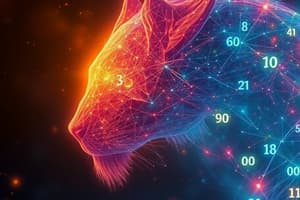Podcast
Questions and Answers
What is one primary goal of studying animal psychology?
What is one primary goal of studying animal psychology?
- To develop new training techniques for pets
- To establish a direct comparison between human and animal emotions
- To prove that all animals can be trained to perform tasks
- To understand how animals perceive the world and their emotional states (correct)
Which of the following methods is NOT typically used in animal psychology research?
Which of the following methods is NOT typically used in animal psychology research?
- Field studies
- Controlled experiments
- Historical archival research (correct)
- Naturalistic observation
What does operant conditioning involve?
What does operant conditioning involve?
- Learning through direct experience and observation
- Learning through reinforcement or punishment (correct)
- Learning through the association of a behavioral response with a stimulus
- Learning that occurs without any environmental interaction
Which of the following best describes the concept of instinct in animal behavior?
Which of the following best describes the concept of instinct in animal behavior?
What role does communication play in animal social structures?
What role does communication play in animal social structures?
Which example illustrates complex cognitive skills in animals?
Which example illustrates complex cognitive skills in animals?
What is the significance of studying emotions in animals?
What is the significance of studying emotions in animals?
What distinguishes ethology from other research methods in animal psychology?
What distinguishes ethology from other research methods in animal psychology?
Flashcards are hidden until you start studying
Study Notes
Overview of Animal Psychology
- Definition: The study of animal behavior and mental processes.
- Purpose: To understand how animals perceive the world, their emotional states, and their cognitive abilities.
Key Concepts
-
Behavioral Observations:
- Focus on observable actions and interactions.
- Use naturalistic observation and controlled experiments.
-
Cognition:
- Study of mental processes including perception, memory, and problem-solving.
- Research shows various species exhibit complex cognitive skills.
-
Emotions in Animals:
- Recognition of a range of emotions such as fear, joy, and attachment.
- Examples include social bonding in elephants and play behavior in dogs.
-
Learning and Conditioning:
- Classical Conditioning: Learning through association (e.g., Pavlov's dogs).
- Operant Conditioning: Learning via reinforcement or punishment (e.g., Skinner box).
-
Communication:
- Animals use vocalizations, body language, and chemical signals.
- Importance of communication in social structures and mating behaviors.
-
Social Structures:
- Study of group dynamics and hierarchies in species like primates, wolves, and cetaceans.
- Impact of social behavior on survival and reproduction.
-
Instinct vs. Learning:
- Instincts: Innate behaviors that are hardwired (e.g., migration).
- Learning: Adaptable behaviors shaped by experience (e.g., tool use).
Research Methods
- Field Studies: Observing animals in their natural habitats.
- Laboratory Studies: Controlled environments to study specific behaviors or cognitive processes.
- Ethology: The scientific study of animal behavior, emphasizing the evolutionary context.
Applications
- Conservation: Understanding animal behavior to inform conservation strategies.
- Animal Welfare: Improving conditions in captivity by studying stress and well-being.
- Human-Animal Interaction: Insights into therapy animals and companionship.
Important Figures
- Charles Darwin: Early contributions to understanding animal instincts.
- Konrad Lorenz: Known for his work on imprinting in birds.
- B.F. Skinner: Pioneered studies in operant conditioning.
Ethical Considerations
- Importance of humane treatment in animal research.
- Consideration of animal welfare and rights in experimentation and observation.
Overview of Animal Psychology
- Definition encompasses the exploration of animal behavior and mental processes.
- Aim is to comprehend how animals interpret their surroundings, their emotional experiences, and cognitive abilities.
Key Concepts
-
Behavioral Observations:
- Emphasizes on observable actions; employs methods such as naturalistic observation and controlled experiments.
-
Cognition:
- Involves investigating mental processes like perception, memory, and problem-solving, revealing that many species possess sophisticated cognitive abilities.
-
Emotions in Animals:
- Acknowledges diverse emotional experiences including fear, joy, and attachment, illustrated by social bonding behaviors in elephants and playfulness in dogs.
-
Learning and Conditioning:
- Classical Conditioning: A learning process through association demonstrated by Pavlov's experiments with dogs.
- Operant Conditioning: Involves learning through reinforcement or punishment, exemplified in experiments using Skinner boxes.
-
Communication:
- Animals communicate via vocal sounds, body language, and chemical signals, which are vital for social interactions and reproductive behaviors.
-
Social Structures:
- Analyzes group dynamics and hierarchies in species like primates, wolves, and cetaceans, highlighting social behavior's role in survival and reproduction.
-
Instinct vs. Learning:
- Instincts are innate and hardwired (e.g., migration patterns), while learning refers to adaptable behaviors shaped by experience (e.g., the use of tools).
Research Methods
- Field Studies: Focus on observing animals in natural environments to gather behavioral data.
- Laboratory Studies: Use controlled settings to investigate specific behaviors or cognitive processes in depth.
- Ethology: A branch of research dedicated to the science of animal behavior, emphasizing evolutionary perspectives.
Applications
- Conservation: Insights into animal behavior can enhance strategies for wildlife conservation.
- Animal Welfare: Research contributes to improving conditions for captive animals by addressing stress and overall well-being.
- Human-Animal Interaction: Provides foundational knowledge about therapy animals and their roles in human companionship.
Important Figures
- Charles Darwin: Contributed to foundational understanding of animal instincts and behaviors.
- Konrad Lorenz: Renowned for his research on imprinting in birds, illustrating behavioral development.
- B.F. Skinner: An influential figure in behaviorism, particularly known for his experiments on operant conditioning.
Ethical Considerations
- Emphasizes the need for humane treatment of animals in research settings.
- Highlights the importance of considering animal welfare and rights during experimentation and observation activities.
Studying That Suits You
Use AI to generate personalized quizzes and flashcards to suit your learning preferences.




